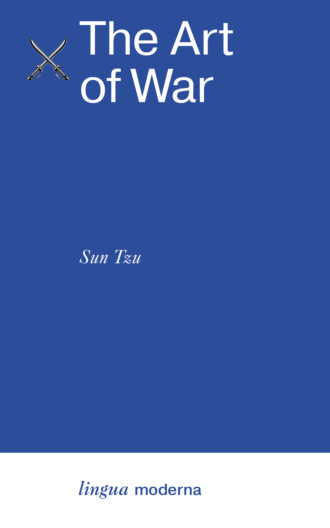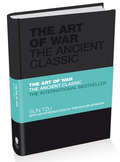
Сунь-цзы
The Art of War
II
Sun and Wu are perhaps held in even greater reverence in Japan than in China, where war is looked upon as a troublesome phase in national life, and victory in battle is not considered the greatest achievement of a state. Far otherwise is it in Japan; and successive generations of her soldiers have been brought up on Sun and Wu. Like other arts, mystery was formerly supposed to surround the art of war, a belief that was encouraged by the strategist; and for a considerable time, the few copies of this book, that were brought over from China to Japan, were jealously guarded by their possessors. Later, as they became known, an army of Japanese commentators arose-for Chinese literature is thought compressed, to be unfolded in the mind of the reader.
To-day Sun and Wu have given way to the scientific works of European writers, but their sayings have become proverbs, and their influence undoubtedly helped the Japanese to victory in the late war. Belief in the importance of a knowledge of the enemy and his resources, of preparation and training, had grown out of a long study of these ancient masters; and since it was the vital importance of a successful issue to the Japanese which, after all, fired their resolution and carried them through, they proved the sage’s words that it is the energy, born of despair, that wins the victory.
III
Little is known of the life of either master. They were in no sense patriots but professional strategists, continually changing their employer. Chinese history tells a famous story about Sun. A certain ruler asked Sun to give a practical demonstration of his principles in the neighbourhood of the palace, and entrusted him with the women of the court for this purpose. During the operations, the leader of one of the sides did not obey the master’s instructions, and her execution was ordered. She happened to be the king’s favourite wife, but Sun pointed out that the king’s wish that her life should be spared was a case of political interference with the general in the field; and the sentence was carried out.
Wu is represented as a person of low moral character. On two separate occasions, for fear of giving rise to suspicion, he killed one of his wives who belonged to a state with which his employer at the time was at war; and, graver still in the eyes of the Chinese historian, he was not present at the death-bed of his mother.
E. F. C.
NOTE.
The translator is indebted to Major J. C. Somerville for his kind help and criticism.
The articles of Suntzu
I
Preliminary reckoning
The words of Sun the Master:-
To all nations War is a great matter. Upon the army death or life depend: it is the means of the existence or destruction of the State.
Therefore it must be diligently studied.
Now, in war, besides stratagem and the situation, there are five indispensable matters. The first is called The Way;[1] the second, Heaven; the third, Earth; the fourth, the Leader; the fifth, Law.
The Way or the proper conduct of man. If the ruling authority be upright, the people are united: fearless of danger, their lives are at the service of their Lord.
Heaven. Yin and Yang;[2] heat and cold; time and season.
Earth. Distance; nature; extent; strategic position.
The Leader. Intelligence; truth; benevolence; courage and strictness.
Law. Partition and ordering of troops.
These things must be known by the leader: to know them is to conquer; to know them not is to be defeated.
Further, with regard to these and the following seven matters, the condition of the enemy must be compared with our own.
The seven matters are:-
The virtue of the prince; the ability of the general; natural advantages; the discipline of the armies; the strength of the soldiers; training of the soldiers; justice both in reward and punishment.
Knowing these things, I can foretell the victor.
If a general under me fight according to my plans,[3] he always conquers, and I continue to employ him; if he differ from my plans, he will be defeated and dismissed from my service.
Wherefore, with regard to the foregoing, considering that with us lies the advantage, and the generals agreeing, we create a situation which promises victory; but as the moment and method cannot be fixed beforehand, the plan must be modified according to circumstances.
War is a thing of pretence: therefore, when capable of action, we pretend disability; when near to the enemy, we pretend to be far; when far away, we pretend to be near.
Allure the enemy by giving him a small advantage. Confuse and capture him. If there be defects, give an appearance of perfection, and awe the enemy. Pretend to be strong, and so cause the enemy to avoid you. Make him angry, and confuse his plans. Pretend to be inferior, and cause him to despise you. If he have superabundance of strength, tire him out; if united, make divisions in his camp. Attack weak points, and appear in unexpected places.
These are the secrets of the successful strategist, therefore they must not be made known beforehand.
At the reckoning in the Sanctuary before fighting, victory is to the side that excels in the foregoing matters. They that have many of these will conquer; they that have few will not conquer; hopeless, indeed, are they that have none.
If the condition of both sides with regard to these matters be known, I can foretell the victor.



